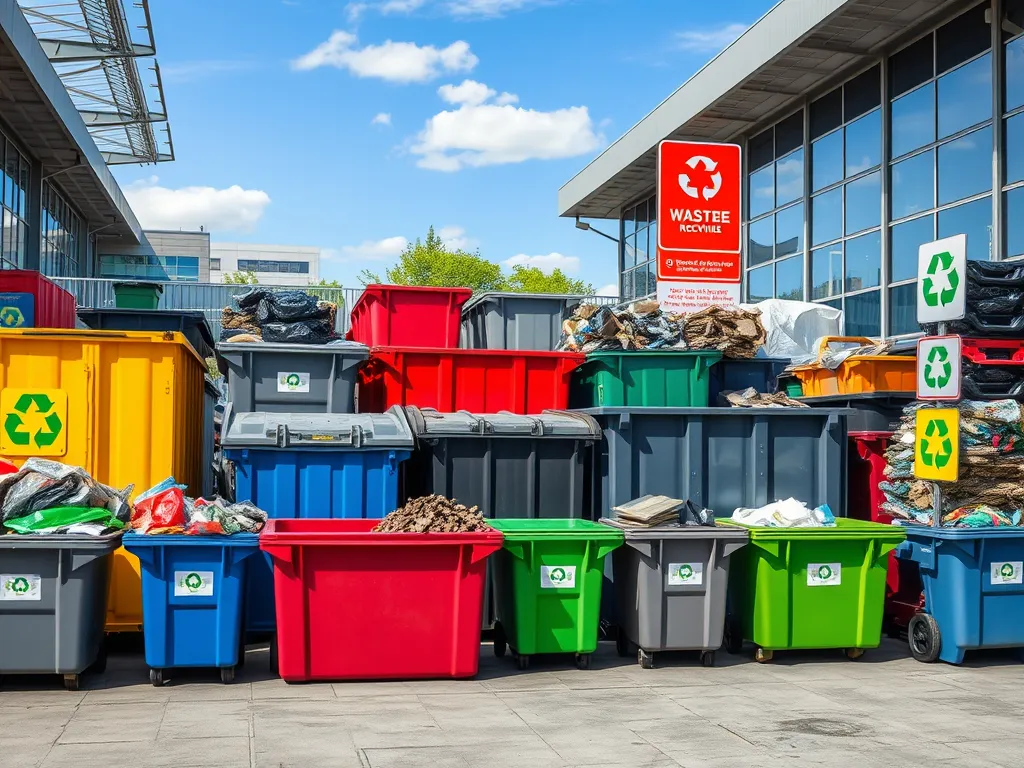Roll-off Dumpsters: The Ultimate Guide to Waste Management

Everything You Need to Know About Roll-off Dumpsters
Roll-off dumpsters are large, open-top containers designed for collecting and transporting waste and debris from construction sites, home renovations, landscaping projects, and more. These dumpsters are a popular choice due to their convenience and versatility, making them ideal for a variety of projects where significant amounts of waste are generated. Whether you're a homeowner undertaking a DIY project or a contractor managing a large construction site, understanding roll-off dumpsters is essential for efficient waste management.
One of the key benefits of roll-off dumpsters is their easy accessibility. They can be delivered directly to your location, placed on your property, and picked up when full. This makes the process of waste disposal straightforward and hassle-free. Additionally, roll-off dumpsters come in various sizes, enabling individuals and businesses to choose the right container based on the amount of waste they expect to generate. This flexibility helps with cost-effectiveness, as you only pay for what you need.
In addition to size and convenience, roll-off dumpsters are also designed for various types of waste. They can accommodate everything from construction materials like wood and metal to yard waste and household debris. Understanding how to select the right dumpster for your specific needs can help streamline your project and ensure that waste disposal is efficient and compliant with local regulations.
When renting a roll-off dumpster, it’s important to take the time to understand the appropriate size, rental process, and any regulatory concerns. This will ensure you have a smooth experience from start to finish. Furthermore, the environmental impact of waste disposal is an increasingly important consideration, and roll-off dumpsters can help facilitate responsible disposal practices.
In summary, roll-off dumpsters provide an effective solution for waste management on various projects. With their convenience, versatility, and range of sizes, they are an invaluable resource for anyone needing to manage large quantities of waste, whether for a home renovation, construction job, or any other cleanup need.
Sizes of Roll-off Dumpsters
10-yard roll-off dumpsters are the smallest size available, making them perfect for smaller projects such as minor home renovations or cleanouts. They can hold approximately 10 cubic yards of waste, which is roughly equivalent to three pickup truck loads. This size is commonly used for disposing of small amounts of debris, like roofing shingles or yard waste.
Implementing well-designed DUMPSTER CORRALS can significantly enhance waste management efficiency in residential and commercial areas.
20-yard roll-off dumpsters are a popular choice for medium-sized projects such as larger home renovations or landscaping jobs. With a capacity of about 20 cubic yards, they can accommodate the equivalent of six pickup truck loads. This size is ideal for projects that generate a moderate amount of waste, like bathroom remodels or garage cleanouts.
30-yard roll-off dumpsters are suitable for larger projects, including substantial home renovations or commercial construction sites. They can hold around 30 cubic yards of debris, which is about nine pickup truck loads. This size is often used for significant constructions like whole home builds or major commercial renovations.
40-yard roll-off dumpsters represent the largest size available and are typically reserved for massive projects such as extensive commercial construction or large-scale cleanouts. With a capacity of 40 cubic yards, equivalent to 12 pickup truck loads, these dumpsters can handle substantial amounts of waste, including furniture, appliances, and construction debris.
Determining the right size for your project involves considering the type and amount of waste you'll be generating. It’s wise to err on the side of caution and choose a slightly larger size if you're unsure, as overfilling a dumpster can incur extra fees or require a second rental.
Uses of Roll-off Dumpsters
Residential construction debris is one of the most common uses for roll-off dumpsters. Contractors and DIY homeowners often need a way to remove excess materials, such as lumber, concrete, and drywall, from the job site efficiently. Roll-off dumpsters provide a centralized location for disposal, keeping work areas tidy and organized.
Commercial renovation waste is another frequent application for roll-off dumpsters. Businesses undergoing renovations need to remove debris quickly to minimize downtime. Renting a roll-off dumpster allows for the efficient disposal of various materials, enabling projects to stay on schedule while maintaining a safe work environment.
Landscaping projects can generate a significant amount of waste, from grass clippings to large branches and rocks. Roll-off dumpsters give landscapers a dedicated area to dispose of such waste, making clean-up easier and maintaining the aesthetic of the property throughout the project.
Event clean-ups are also a great use for roll-off dumpsters, particularly for large gatherings or festivals where vast amounts of waste are generated. Having a roll-off dumpster on-site ensures proper waste disposal and prevents littering, facilitating a smooth clean-up process post-event.
Finally, heavy material disposal is an important aspect of many construction and demolition projects. Roll-off dumpsters can handle the weight and bulk of materials like concrete, bricks, and metals, allowing for safe and responsible disposal away from job sites.
Renting Roll-off Dumpsters
When looking to rent a roll-off dumpster, selecting a reputable rental company is crucial. Research local companies, read customer reviews, and compare pricing and services to find the best option for your needs. Make sure to inquire about their experience, availability, and whether they offer delivery and pick-up services.
What to expect during delivery of a roll-off dumpster includes a brief consultation about where you’d like the dumpster placed. The delivery truck will the place the dumpster on your property, ensuring it is positioned in a safe and accessible location. Proper placement is important to avoid obstructing traffic, sidewalks, or driveways.
Rental pricing and fees for roll-off dumpsters can vary widely based on size, length of rental, and the type of waste being disposed of. It's essential to clarify the total cost before the rental occurs, including additional fees that may apply, such as overweight fees or costs for extended rental periods.
Before a roll-off dumpster delivery, preparing your property is necessary. Ensure that the intended placement area is clear of obstacles, such as vehicles, landscaping, or low-hanging branches. Additionally, knowing your local regulations regarding dumpster placement will help avoid any unexpected issues during the rental period.
Understanding rental agreements for roll-off dumpsters is important for a smooth renting experience. Read through the terms and conditions thoroughly, paying close attention to any restrictions regarding the types of materials that can be disposed of in the dumpster and your responsibilities during the rental period.
Benefits of Roll-off Dumpsters
One of the primary benefits of roll-off dumpsters is the convenience they offer for large-scale projects. They can be delivered directly to your site, allowing for the easy disposal of waste as it accumulates. This saves time and effort compared to multiple trips to a waste disposal facility.
Roll-off dumpsters also save time by streamlining the waste disposal process. With a dedicated dumpster on-site, workers can quickly dispose of debris, allowing them to focus on the project at hand without unnecessary interruptions for waste disposal.
Additionally, roll-off dumpsters promote environmental responsibility by ensuring that waste is properly disposed of and recycled when possible. Many rental companies have protocols in place for sorting and recycling materials, reducing the amount of waste sent to landfills.
Safety and site cleanliness are enhanced with the use of roll-off dumpsters. By keeping debris contained, these dumpsters reduce the risk of accidents and injuries on the job site, leading to a safer working environment for all.
Finally, roll-off dumpsters are a cost-effective solution for waste removal. By renting the appropriate size dumpster, you can efficiently manage waste disposal without incurring excessive fees associated with multiple trips to a landfill or recycling center.
Regulations and Best Practices
Local regulations for dumpster use can vary significantly, so it’s essential to understand the laws in your area before renting a roll-off dumpster. Some municipalities may require a permit for dumpster placement, especially if it’s on public property or a sidewalk. Checking with local authorities can help avoid fines and ensure compliance.
Best practices for loading dumpsters involve distributing weight evenly and avoiding overloading. This not only meets safety regulations but also ensures that the dumpster can be safely transported once it’s full. Remember to leave some space at the top to prevent spillage during transport.
Common prohibited items include hazardous materials like chemicals, batteries, and certain electronics. Familiarize yourself with these restrictions to avoid additional fees or penalties. Rental companies typically provide a list of items that cannot be disposed of in their dumpsters.
To maximize space in your roll-off dumpster, break down large items into smaller pieces when possible and stack materials to utilize vertical space effectively. This can help reduce the number of trips required to dispose of your waste.
Finally, ensuring safety during disposal involves maintaining a safe work environment around the dumpster. This includes keeping the area clean, ensuring proper access for trucks, and adhering to all safety guidelines provided by the rental company.
